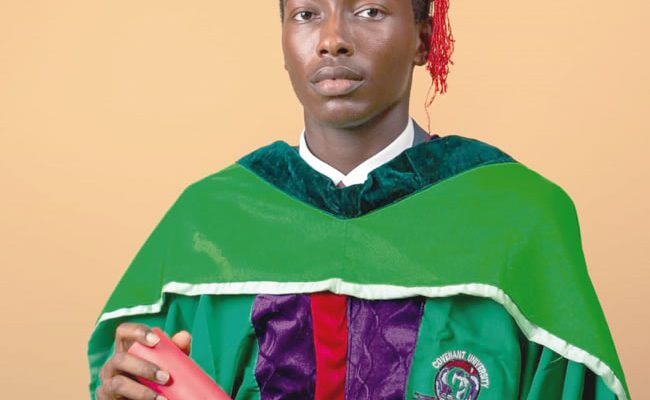Sanni Rilwan graduated with a First Class from the Department of Industrial Mathematics, Covenant University, in the 2023-2024 session. With a Cumulative Grade Point Average (CGPA) of 4.99 on a scale of 5, he emerged as the best-graduating student of the university. In this interview by AYO AKANO, he speaks about his academic journey and other issues.
In your LinkedIn post, where you shared your First Class feat, you stated that after secondary school, you faced a setback due to a wrong subject combination in your UTME examination which delayed your admission by a year. Tell us about it.
I initially wanted to study computer science at the University of Ibadan because someone I looked up to attended the university. I checked the JAMB website and saw that Economics, my second favourite subject, was listed as an eligible option as a subject, so I went for it. However, after completing the post-UTME and the release of the admission list, I discovered I was not admitted because I had written Economics instead of Chemistry. The following year, I explored a few things, including writing the SAT examination, but due to COVID-19, I did not apply to study abroad. When I accepted that I would stay in the country, I started preparing for UTME again, this time with Chemistry instead of Economics.

During this period, I also had the opportunity to reflect on what I wanted out of a degree, and what that degree would be. I experienced a lot of growth mentally and emotionally during that time because the setback hit me hard. However, I persevered and learned resilience in the process.
Of all the courses to study, why did you choose Mathematics? And, why did you choose Covenant University to study it?
After spending a year at home, I had time to reflect on what I truly enjoyed. I have always had a passion for mathematics. I was also interested in computer science because of its growing importance in today’s world.

When I learned about Covenant University’s Industrial Mathematics programme, which included the option to study computer science, it felt like the perfect fit for me. Covenant University is known for being one of the best universities in the country, and the added benefit of being free from the disruptions caused by strikes made the decision even more appealing. I discussed the idea with my parents since they were initially more inclined toward me attending a public university. However, after a lot of convincing — and with input from a relative in the academia, who advised that Covenant would be a wise choice if they could afford it — they supported my decision.
The combination of quality education, stability, and the ability to pursue both of my interests made Covenant University the best choice for me.
You graduated with a CGPA of 4.99. Are you sad that you did not graduate with a perfect CGPA of 5? What course(s) prevented you from not getting a perfect CGPA?
It was a biology practical 100-level course that prevented me from graduating with a perfect CGPA. I cannot say with absolute certainty that ‘X’ happened.
I was sad about it at the time, but that setback eventually motivated me to perform well in the semesters that followed. If I had the opportunity to change things, I probably would not change that. However, getting a perfect CGPA would have been nice since it has never been done by a male Covenant University student.
To make a First Class and be the overall best-graduating student at your university is not easy. What did you do differently to achieve these feats?
I believe one key factor was that I genuinely enjoyed my course, which made studying more exciting rather than burdensome. Many students, unfortunately, pursue programmes they are not passionate about, hoping the career prospects would make up for it. But that often makes it harder to stay motivated.
For me, a balanced approach worked best: leveraging AI tools to simplify complex concepts and calculation-based courses, focusing on consistent practice. Repetition sharpens problem-solving skills. Ultimately, the combination of passion, discipline, and smart study strategies was what helped me achieve my goals.
What aspects of mathematics interest you more and why?
I would say differential equations interest me the most because they allow us to model many real-life phenomena, making them highly applicable to various fields, especially scientific research and finance. My interest in differential equations ultimately led me to work on a project that was based on it. I also enjoyed operations research, as it combines mathematical techniques with decision-making processes. It was always fun for me to calculate what combination of products would help a certain company either maximise their products and revenue or minimise their costs.
What was the title of your final-year project and what were the major findings from it?
My final-year project was titled ‘Solutions of nth order differential equations using d-operator method and Python programming language’.
Rather than traditional research, it focuses on building a tool to help students in my department improve their performance in differential equation courses. The project allows students to input any differential equation they want to solve, and if they choose, the tool would also explain the approach used, helping them better understand the underlying concepts.
Most people do not know the real use or application of mathematics to everyday societal problems. Could you offer a simple use of your course to society?
A simple example would be the optimisation of resources. Businesses often face the challenge of using limited resources, like money, time, or materials in the most efficient way possible. Operations research helps to solve that by providing models that help guide decision-making by analysing various factors and suggesting the best ways to allocate resources. For example, companies in logistics use mathematical techniques like linear programming to optimise delivery routes, minimise fuel costs, and improve overall efficiency.
In your LinkedIn bio, you regarded yourself as a consultant. What are you are consultant in? How do you wish to use your mathematics knowledge to impact society?
I consider myself a strategy consultant because it is an area that aligns with both my interests and my skills. My first experience in this space came when a friend reached out for advice on defining the unique value proposition for his startup. I thoroughly enjoyed the process of analysing the business, understanding the market space, and helping him craft a strategy that would differentiate his startup from competitors. That experience sparked my interest in consulting. Since then, I have become more focused on building my expertise in solving business problems through strategic thinking and analysis.
In terms of using my mathematics knowledge, I plan to leverage my strong analytical background to provide data-driven solutions to clients, helping them make informed, strategic decisions that can have a meaningful impact.
A first-class degree is not a first-class ticket to a lucrative job. In fact, many First Class graduates are roaming the streets looking for jobs. What special skills or training do you have that distinguishes you from the gang of mathematics First Class graduates?
I feel that if you can graduate with a First Class, you probably already have a good grasp of concepts and whatnot, and the best way to stand out would be the “extras” — things like who you are as an individual, soft skills and networks — that way you have people speaking of you in rooms where you are not.
I would say that I am doing pretty well for myself in that regard. During an internship, in my third year, my work ethic, communication, and time management skills were complimented. These things may seem little, but they can make all the difference when push comes to shove.
What is next for you now after graduation? And where do you see yourself in five years?
I am passionate about management consulting and finance — these are areas I plan to focus on moving forward.
In five years, I see myself as a well-rounded consultant with deep expertise across multiple industries, delivering strategic solutions to clients. I also aim to be well on my way to earning my Chartered Financial Analyst (CFA) designation, as it is a key credential that will further strengthen my financial knowledge. Additionally, I hope to explore angel investing, which involves providing capital to startups in exchange for part ownership. It requires extensive business insight and experience. So, I plan to leverage the knowledge I would gain in consulting to make informed investment decisions and help promising startups grow.
What is your advice to students who are aspiring to achieve the kind of academic feat you achieved?
I would say consistency is key — academic success comes from staying disciplined and putting in the work regularly to build a strong foundation over time, even when it gets tough. Having a strong support system, whether from friends, family, or mentors, can make all the difference by encouraging and pushing you forward when you feel overwhelmed or tempted to give up.
Lastly, it is important to know when to take a break. In a bid to improve performance, many students think adding more study hours will help, but it often leads to burnout. Knowing when to stop and rest is just as important as working hard.
READ ALSO: Ooni Adeyeye, big inspiration to Yoruba traditional institution — Gani Adams







